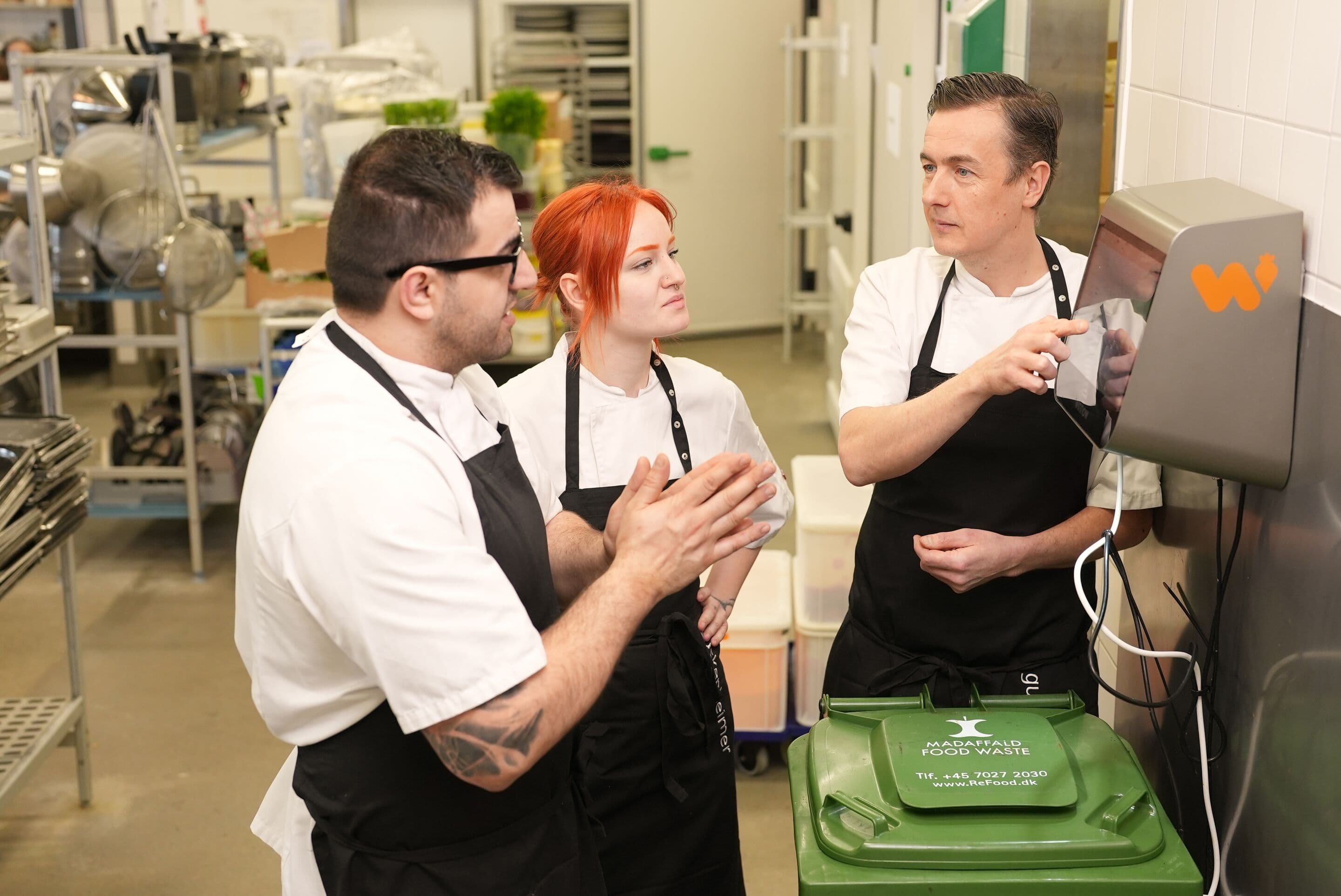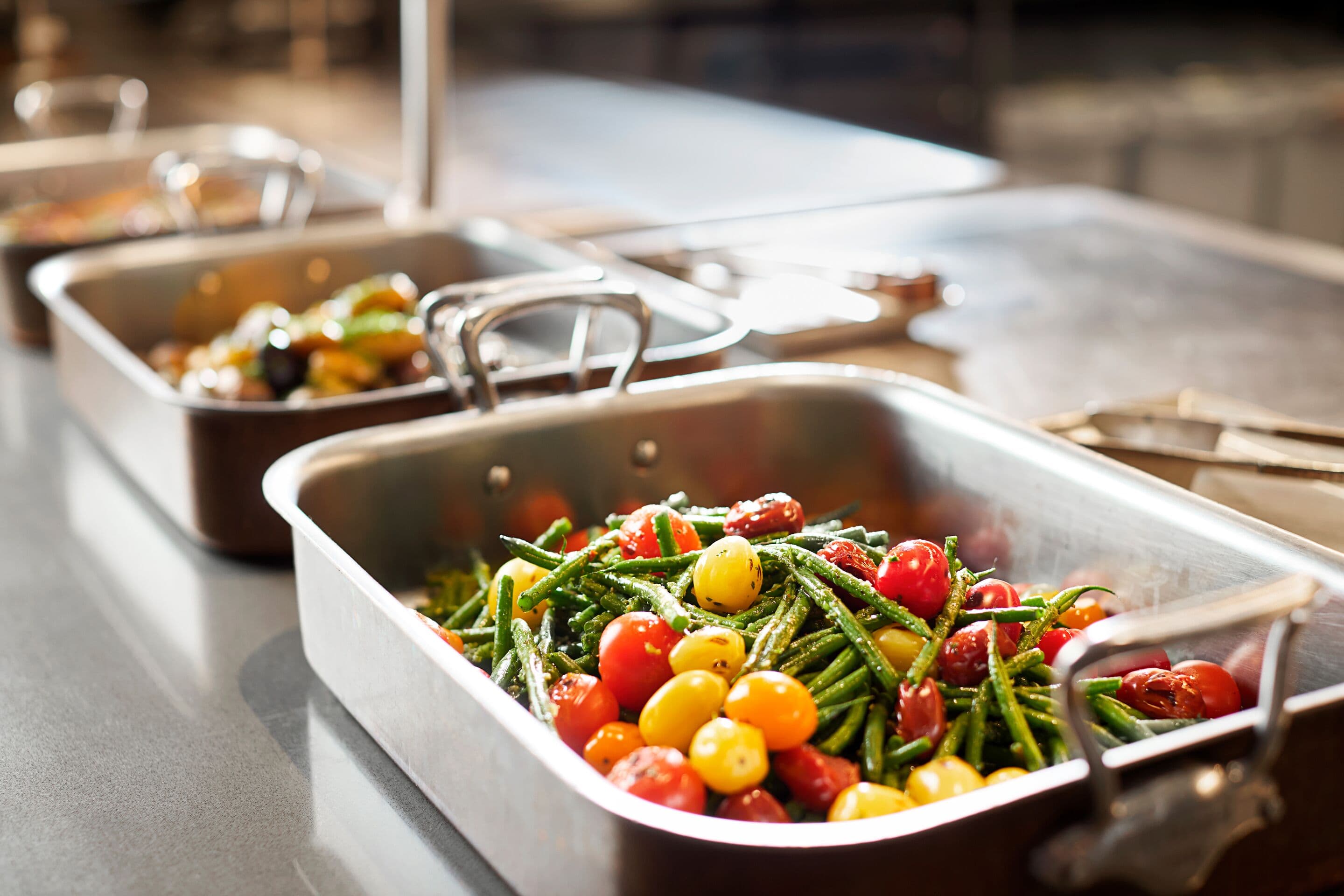
Guckenheimer's initiative to reduce food waste saves nearly a million meals each year and dramatically cuts emissions with the help of AI.
In the United States, around one third of the food intended for human consumption is wasted. Food waste also has a tremendous carbon footprint, from transport and preparation to the methane gases generated by food in landfills.
In 2020, Guckenheimer launched a forward-thinking initiative to tackle this critical issue for the food service industry. Leveraging the creativity of our culinary professionals, strategic food serving architectures, and Winnow’s cutting-edge AI technology, Guckenheimer set an ambitious goal to cut food waste by 50% by the end of 2024. By the third quarter of 2024, the initiative had surpassed expectations, achieving a 64% reduction in food waste and establishing a new standard for sustainability in corporate dining.
Operational Strategy
To address the complexities of food waste, Guckenheimer took a comprehensive approach that combined culinary expertise, process optimization and smart technology. A key component of this strategy was the implementation of Winnow’s AI-enabled tracking systems across Guckenheimer kitchens. This technology provides real-time data and analytics on food preparation, waste patterns and commonly discarded items. These insights supported Guckenheimer chefs as they refined menus, adjusted portion sizes and re-imagined kitchen workflows to mitigate waste at the source. The result was not just greater efficiency, but a strengthened culture of innovation and shared accountability across teams.
In 2024, Guckenheimer also joined the U.S. Food Waste Pact, a national voluntary agreement to help food businesses accelerate progress toward their waste reduction targets. The Food Waste Pact helps reduce waste in operations through measurement and annual food waste data reporting, working groups that drive cross-industry collaboration, the implementation of pilot programs and other scalable solutions for waste reduction.
Environmental and Social Impact
The initiative has delivered measurable, large-scale results. By reducing food waste by 64%, Guckenheimer saves an estimated 983,000 meals annually and prevents approximately 1,500 metric tons of CO2e emissions. These efforts directly support Guckenheimer’s parent company ISS’ global goal to halve food waste by 2027 and align with the United Nations’ Sustainable Development Goal 12.3, which aims to cut global food waste in half by 2030.
Beyond environmental benefits, reducing food waste also helped Guckenheimer strengthen its commitment to social sustainability. Surplus food is redistributed through food recovery partnerships, reducing food insecurity in the communities where the company operates. The program has also become a point of pride for employees, fostering collaboration, storytelling and career growth opportunities within the culinary team.
One example of a successful partnership is Guckenheimer’s collaboration with food distribution and recovery company Goodr, a certified woman and minority-owned business, to measure, assess and re-route surplus food from corporate cafés and dining venues to people in need. Goodr’s technology features a dashboard for chefs to track surplus food donations and adjust preparation levels or ordering of specific items as needed to control costs.
Scalability and Future-Proofing
The success of this food waste initiative is not limited to Guckenheimer’s U.S. operations. Winnow’s AI technology is already deployed across ISS accounts in 15 countries, including Denmark, the United Kingdom, Australia and the Netherlands. Designed to be scalable and adaptable, the program provides a framework for ongoing innovation in food waste management, ensuring that ISS and Guckenheimer can meet evolving customer expectations and regulatory requirements while maintaining their position as a sustainable food service leader.
Proof of Success
By surpassing our 50% reduction goal, Guckenheimer has demonstrated that large-scale food waste reduction is both achievable and impactful. This milestone positions us as the first major U.S. food service provider to achieve such a significant reduction, reinforcing our reputation as a pioneer in sustainability and environmental stewardship. With a focus on data-driven strategies and continuous improvement, Guckenheimer continues to set the benchmark for responsible, future-ready food service operations.
Impact At a Glance
In our efforts to provide ongoing food waste mitigation, Guckenheimer has achieved the following:
Guckenheimer's goal was to reduce food waste by 50% by 2024, which — with a 64% reduction — we surpassed by a wide margin.
Guckenheimer also had a half-way goal of reducing food waste by 25% by the end of 2022, which we achieved.
Guckenheimer and Winnow’s reduction calculation methodology uses Q2 2022 food waste data as a baseline for reduction measurement. The Q2 2022 baseline is a weighted average across our portfolio including most accounts using Winnow, along with others tracking food waste in different ways. Data from Q2 2024 was then measured against Q2 2022 baseline data, reflecting a 64% reduction achievement.
Broadly, ISS is on track to meet our global ambition to reduce food waste by 50% by 2027.
Across North America, Guckenheimer is saving up to 983,000 meals and preventing 1,500 metric tons of CO2e emissions each year. This is a conservative figure calculated using a blend of FAO and WRAP estimates for emissions associated with food waste.
In reducing waste, we are also saving over $1 million in food costs each year, reducing client spending that can be re-invested back into their organization.


